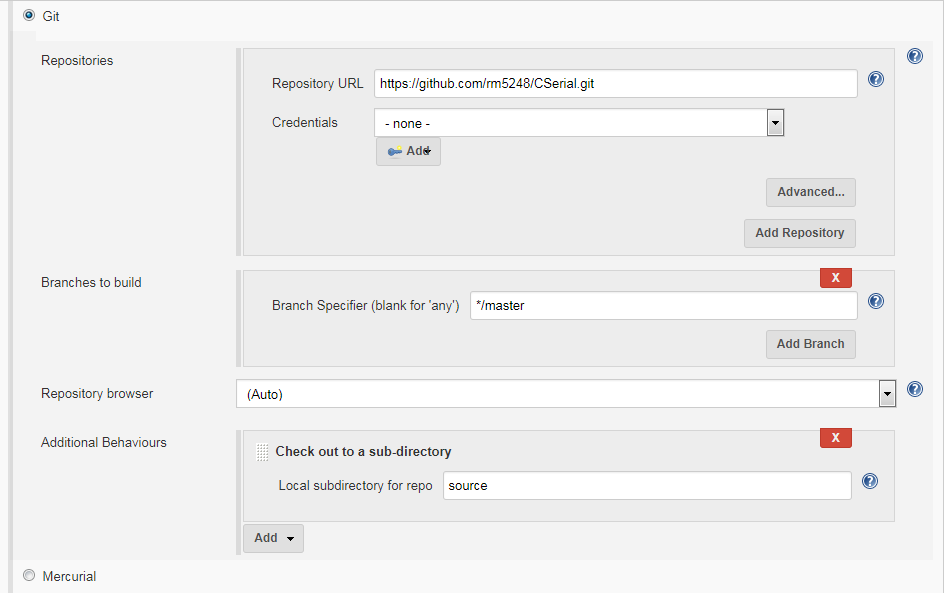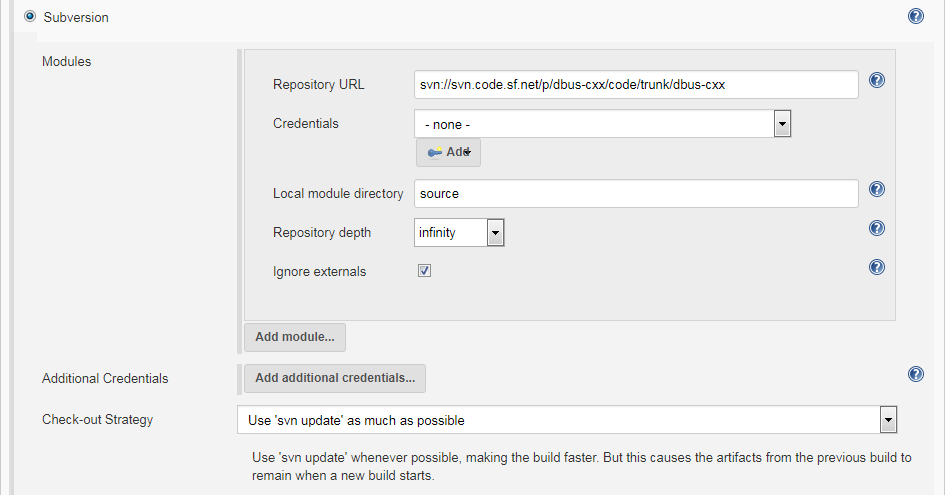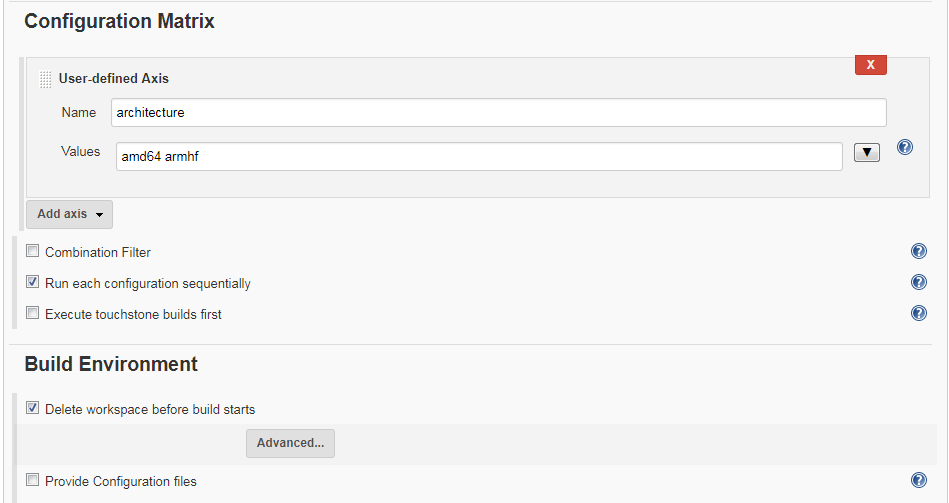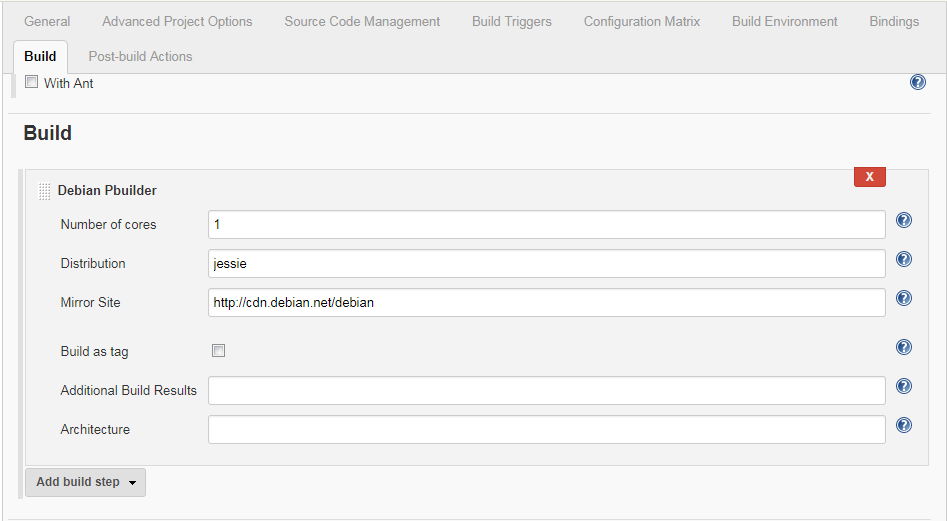Plugin Information |
|---|
View Debian Pbuilder on the plugin site for more information. |
Build Debian packages in Jenkins!
This plugin is based largely off of jenkins-debian-glue, however with support for builder packages in a proper Jenkins way.
System Setup
Before you can successfully run the plugin, there are certain requirements that must be met on the node(s) that you wish to run on.
Install needed dependencies:
apt-get install qemu-user-static devscripts cowbuilder dpkg-dev
If building Debian packages on Ubuntu, make sure that the package debian-archive-keyring is installed
Like jenkins-debian-glue, make sure that sudo is configured properly. As taken from the jenkins-debian-glue webpage, add the following to either /etc/sudoers, or create a new file(e.g. /etc/sudoers.d/jenkins):
jenkins ALL=NOPASSWD: /usr/sbin/cowbuilder, /usr/sbin/chroot Defaults env_keep+="DEB_* DIST ARCH"
(this assumes that Jenkins is running under the Jenkins user)
Using the Plugin
Configuration Options
There are several global configuration options. These options may be found by going to "Manage Jenkins" → "Configure System".
- Email address - this is the email that is set in the changelog entry for the build. It need not be an actual email address
- Version format - Determines how the package will be versioned if not a tag build
- Debian directory - determines where the debian/ folder is, by default the project should be checked out to a directory called 'source'
Project Setup(Traditional)
This plugin may be configured as both a traditional Jenkins build, or as a Pipeline project.
- Create a new project. If you want to build for multiple architectures, select "Multi-configuration project"
- Checkout source code. When you checkout the source code for the project, it should be in a subdirectory called 'source'(this value can be changed on either a per-build configuration or globally). This can be done as either an SVN repository, or a git repository. To checkout to the proper directory using git, go to "Additional Behaviors" and select "Check out to a sub-directory", and put "source" as the value. To checkout to the proper directory using SVN, under "Local module directory" put "source" as the value.
Under 'Build Environment', select 'Delete workspace before build starts'
If you have a matrix configuration project, add a new variable called "architecture". Put in the proper architectures to build for in this section; this must map to a valid architecture that exists in the distribution repos.
Under the 'Build' section, add 'Debian Pbuilder'. Most of these settings may be left at their default values, however it is highly recommended to fill in the "Distribution" and "Mirror Site" variables in order to ensure that you get a consistent build. Otherwise, pbuilder will use the defaults for whatever distribution you are currently running.
If you have custom pbuilder hook files that you want to install, install the Config File Provider to add in config files. Set the 'target' option to be `hookdir/<file-name>`.
Project Setup(Pipeline)
If using pipeline, you may setup a job similar to the following:
node(){
ws{
stage( "clean" ){
cleanWs()
}
stage( "checkout" ){
checkout([$class: 'GitSCM', branches:
[[name: '*/jenkinsfile-updates']],
doGenerateSubmoduleConfigurations: false,
extensions: [[$class: 'RelativeTargetDirectory', relativeTargetDir: 'source']],
submoduleCfg: [],
userRemoteConfigs: [[credentialsId: '78de5c66-5dfb-4c95-8ad9-ec34e8dee4ec', url: 'git@github.com:rm5248/CSerial.git']]])
}
stage("build"){
//Actually build the package.
//Note that you can go to the 'Pipeline Syntax' page on your Jenkins instance to generate this automatically
debianPbuilder additionalBuildResults: '', architecture: '', distribution: 'jessie', keyring: '', mirrorSite: 'http://ftp.us.debian.org'
}
}
}
The following example shows how to build for multiple architectures:
def axisArchitecture = ["amd64", "armhf"]
def axisNode = ["master"]
def tasks = [:]
for( int i = 0; i < axisArchitecture.size(); i++ ){
def arch = axisArchitecture[i];
tasks["${axisNode[0]}/${axisArchitecture[i]}"] = {
node(axisNode[0]){
ws{
stage( "clean" ){
cleanWs()
}
stage( "checkout" ){
checkout([$class: 'GitSCM', branches:
[[name: '*/jenkinsfile-updates']],
doGenerateSubmoduleConfigurations: false,
extensions: [[$class: 'RelativeTargetDirectory', relativeTargetDir: 'source']],
submoduleCfg: [],
userRemoteConfigs: [[credentialsId: '78de5c66-5dfb-4c95-8ad9-ec34e8dee4ec', url: 'git@github.com:rm5248/CSerial.git']]])
}
stage("build-${arch}"){
debianPbuilder architecture:"${arch}"
}
}
}
}
}
stage('build'){
parallel tasks
}
Package Versioning
By default the plugin will increment the current version number by reading 'debian/changelog'. The algorithm follows the standard Debian practice of packages having a ~ being a pre-release version, and packages with a + denoting a version greater than what is default. Note that this only happens if the the distribution set in 'debian/changelog' is UNRELEASED, or a tag is being built. Tags are automatically scanned; if using SVN or git, the environment variables SVN_URL_1 and GIT_BRANCH are scanned for the substring "tags/"; if the substring is found, the package will be built as a tag. Otherwise, you can also select the "Build as tag" to force the package to not increment the version number, or alternatively set the environment variable DEB_PBUILDER_BUILDING_TAG if you are building a tag.
Artifacts
All generated files are automatically added to the build artifacts for easy retrieval. This includes the deb files, as well as the dsc and tar files used to build the package in the pbuilder environment.
Output
All output can be found in the build output of the project when it is built. If for some reason the build fails, this is a good first place to look. If there is a configuration problem, a (hopefully) useful error message will be printed out when the build fails.
Building packages with 'quilt' format
When building a package with format "3.0 (quilt)", you must provide the orig.tar.gz file for the builder to work properly. This can be done one of two ways: either you can provide the orig.tar.gz through a pre-build step of some kind, or under the 'advanced' section there is a field for you to fill in the name of the package to checkout using the 'pristine-tar' command.
Issue Tracking
Please file any bugs that you may find on the Jenkins JIRA, using the debian-pbuilder-plugin component. Click here for all open issues.
Releases
Version 1.7(2019-10-12)
- Fixed a few minor issues with building from pipeline[PR #3]
Version 1.6(2019-04-21)
- Removed file lock when building packages; pbuilder should take care of this automatically and it probably doesn't work with multiple slaves anyway
- Catch correct exception if trying to create multiple chroots at the same time
- Added an option to change the pbuilder dependency resolver. Changing the dependency resolver fixes problems with apt segfaulting on an armhf chroot.
- Made the global configuration actually save and load correctly.
- Print out a more useful error message when the debian/source/format file doesn't exist or is bad.
Version 1.5(2019-01-27)
- Added ability to use pristine-tar to get orig.tar.gz file(JENKINS-52645)
- Added ability to set components when creating pbuilder base. This is mostly useful for building Ubuntu packages.
Version 1.4(2018-05-12)
Added a setting for the keyring.
Auto-detection for building Debian packages on Ubuntu should still work, but this is useful for overriding it
Thanks to jayjlawrence with PR #1 for prompting this change
Version 1.3(2018-01-13)
- Plugin does not depend on pipeline
- Fixed JENKINS-48921
Version 1.2(2017-12-23)
- First official release on Jenkins.io
- No changes to code since version 1.1, only documentation/POM updates
Version 1.1
- Support for Pipeline jobs.
- Added configuration options for versioning
Version 1.0
- Initial Release of software. Can build projects of multiple types.



